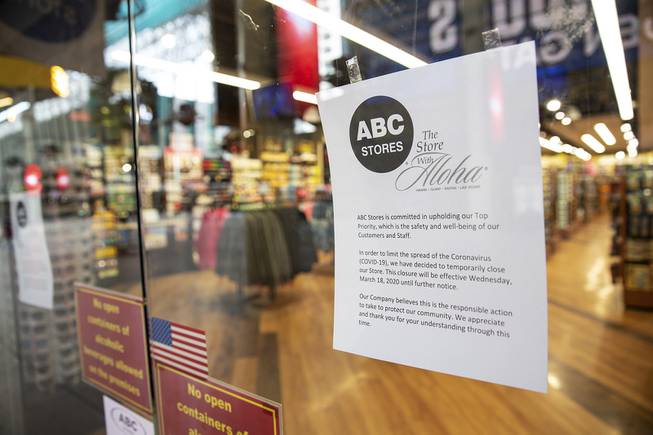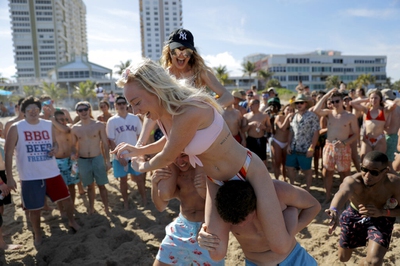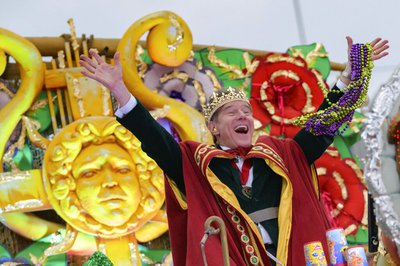
ABC Stores is temporarily closed after Gov. Steve Sisolak ordered a mandatory closure of all nonessential businesses in an effort to combat the spread of COVID-19, Wednesday, March 18, 2020.
Friday, April 17, 2020 | 2 a.m.
On Florida’s Pompano Beach, just north of Fort Lauderdale, two young women laugh as they’re photographed having a chicken fight, surrounded by dozens of swimsuit-clad spring breakers who have crowded around them to watch.
The date: March 17, the same day Gov. Steve Sisolak ordered the closure of nonessential businesses in Nevada and shut down gaming in the state.
While Nevadans solemnly began preparing for an unprecedented time of job losses, self-isolation and uncertainty, scenes like the one captured by a news photographer on Pompano Beach were happening in other coastal cities in Florida. For weeks, tens of thousands of spring breakers had been cramming themselves into hotels four and five to a room, mobbing beaches by day and packing dance floors at night.
It was a setting perfectly suited for the spread of the coronavirus — a petri dish of sunscreen, alcohol-lowered inhibitions and the close physical contact that allows the deadly pathogen to pass from one person to others.

Cece Guida, 19, top, of New York City, pushes on Sam Reddick, 20, of Evansville, Ind., as spring break revelers look on during a game of chicken fight on the beach, Tuesday, March 17, 2020, in Pompano Beach, Fla. As a response to the coronavirus pandemic, Florida Gov. Ron DeSantis ordered all bars be shut down for 30 days beginning at 5 p.m. and many Florida beaches are turning away spring break crowds urging them to engage in social distancing.
But Florida Gov. Ron DeSantis never stopped the party, despite rapidly escalating concerns that the spring breakers were being exposed to the virus and would take it with them after packing up their swimsuits and heading home. Instead, he meekly ordered crowd-size limits (which were not enforced) and left it to local officials to decide whether to shut down the beaches. The result was a hodge-podge series of closures that stretched into the third week of the month and prompted a national outcry.
Meanwhile, three states away, Louisiana was already dealing with a rapidly escalating outbreak that would later be largely blamed on New Orleans’ citywide Mardi Gras celebration, which was staged over a 10-day period beginning in late February. Within four weeks of that event, during which the city estimated it would receive 1.4 million visitors, Louisiana went from having no cases of the disease to 2,300-plus cases and 83 deaths, and had become one of the nation’s hot spots for the pandemic.
What the streets of New Orleans and the beaches of Florida had in common, according to health experts, was being home to “superspreading events” which can quickly and explosively fuel a pandemic and put the entire nation at deeper risk.
The equation is brutally simple: When large crowds of people gather in tight proximity, the coronavirus can spread from infected individuals to new hosts through respiratory droplets that are released from the body by sneezing, coughing and even talking. The age of the crowd doesn’t matter — the virus can infect anyone — and someone doesn’t have to be displaying symptoms of COVID-19 to be carrying the virus. When those crowds disperse, infected individuals take it with them to wherever they live and transit it to anyone they meet on their way home, who in turn spread it elsewhere.
But another common thread for Florida and Louisiana is that officials in both states underplayed concerns and warnings from public health officials about large-crowd gatherings. By early March, the Centers for Disease Control and Prevention had issued an advisory against crowds of more than 250 people, yet Florida’s beaches were jumping with spring breakers.
Nevada was different — it moved quickly to shoulder the responsibility for the safety of its workers, our residents, our guests and the entire nation.
Here, Strip resorts began closing their buffets and restaurants as early as March 10, while Sisolak declared a state of emergency on the 12th, then closed schools on March 15. Two days later came the historic step of essentially hanging a “We’re closed” sign in Las Vegas.
Nevada and Las Vegas bore this burden for more than the state’s residents: We did it to protect the entire nation.
The mistakes made in Louisiana and Florida wouldn’t be replicated here. While officials in those states were being criticized for sacrificing public safety for economic reasons — spring break is one of the most lucrative seasons for beach communities, the same for Mardi Gras and New Orleans — Nevada was making painful decisions in the name of protecting people.
We accepted devastating economic consequences in shutting down fast and fully to slow the pandemic’s spread across America.
The numbers show the enormity of our sacrifice. The tourism industry in Nevada supports one of every three jobs in the state, generating $20 billion in annual wages and 45% of the state’s total economic output. Darkening it causes ripples throughout our economy, including direct job losses for thousands of employees to reductions in tax dollars that support schools, social services and infrastructure.
In the past 30 days, more than 300,000 Nevadans have filed unemployment claims. That’s nearly more than the number of claims filed during all of 2009, when 320,000 Nevadans sought unemployment during the teeth of the Great Recession.
Citing the state’s reliance on hospitality and gaming, study after study have identified Las Vegas and Nevada as areas that will be hit hardest economically. The most recent example came from Oxford Economics, which rated Nevada as the second-most economically vulnerable state behind Maine.
Yet our closures were the responsible thing to do, given that the effectiveness of social distancing depends on the promptness and completeness of shutdowns. And now, as the human toll of allowing spring break and Mardi Gras to play out becomes increasingly clear, the benefit of Las Vegas’ heroic sacrifice is also beginning to materialize.
Although it will probably never be known exactly how many people were exposed to the virus in Florida, COVID-19 cases from coast to coast have been traced to spring break. At one event alone, a festival held March 4-10 in Miami Beach, two attendees have died and dozens have reported either being symptomatic or testing positive. There’s no telling how many people have been exposed through contact with those individuals, or how many asymptomatic individuals who attended the festival may have passed on the pathogen.
Had Nevada stayed open just a week or two longer, it’s obvious the health effects in the city would be significantly worse than they are. And the health of the nation and the world would have been adversely affected as well.
For this reason and others, Las Vegas deserves special federal aid not provided to other places.
The pandemic hasn’t hit all communities equally, so it wouldn’t be fair to distribute aid on a one-size-fits-all basis. New York, for example, will need additional help recovering due to the extensive loss of life there.
Las Vegas and Nevada are a special case for entirely different reasons. We shut down fast to save the nation, and now a slow and cautious reopening will be needed to continue guarding against the spread of the virus. But because of our unique economy, we face a particularly heavy toll in doing our part to protect the nation.
At a time when bailouts are being discussed for the cruise ship industry, which is almost uniformly foreign-flagged and pays no U.S. taxes, and certain businesses like Boeing and the airlines, Las Vegas and Nevada urgently deserve special consideration. Another parallel is the agriculture industry, which received $28 billion in aid during 2018 and 2019 to offset damage caused by President Donald Trump’s tariffs. Nevada deserves the same after shouldering a special responsibility to protect the country.
Unfortunately, Washington isn’t recognizing the unique nature of our actions and our needs. The nation needs to be confident that Nevada will make the right decisions to protect the public health, and in turn Nevada needs to be confident the federal government won’t ignore the exceptional sacrifice we’re making.
Yes, we’ve received federal aid, but not even our fair share. Small gaming businesses have largely been frozen out of obtaining loans through the Small Business Administration’s $349 billion Paycheck Protection Program, for instance. However, the needs in Nevada are starker and all operations in the state are at risk. The large companies here made a special sacrifice for the nation and should receive the same kind of dedicated support that was provided to the airline industry, which got $25 billion, half of which was an outright grant. Even if half of what went to the airline industry was provided to Nevada’s tourism industry, it would go a long way to solving the problems here. More appropriately, Nevada should at least receive the same package that the airlines received. We put an entire state at risk for the good of everyone in the country.
As one of the fastest-growing cities in the U.S. and one of the nation’s foremost tourist destinations for both domestic and international travelers, Las Vegas is an American treasure.
The White House and Congress would be serving the national interest by treating us as such, and helping us get through this time of need.
Meanwhile, our community is going about its specialty — caring for others — but in a new way. We’re being especially resolute in battling the pandemic: In a recent examination of cellphone data nationwide by the technology company Unacast, Nevada was one of only two states to receive an A grade on social distancing.
Had we acted like Florida because of greed, America would be much sicker and more people would die. But we stepped up and did our duty. We didn’t see the pandemic as a time for playing around on the beach, we recognized the deadly threat it presented.
Simply put, our city and state took a bullet for the nation. We suffered enormous damage from it, with more to come, and will need a great deal of time to recover.
But we’ve accepted the public health imperative and made a heroic sacrifice for our own residents and the entire nation. And in doing so, we’ve built a powerful case for the nation’s leadership to respond to us in kind.

